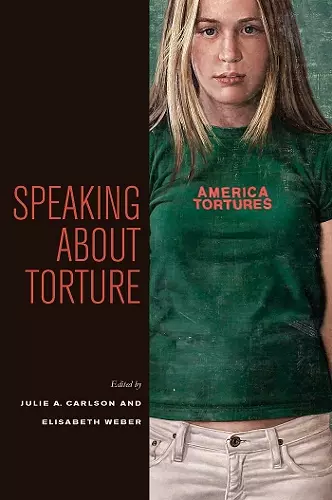Speaking about Torture
Elisabeth Weber editor Julie A Carlson editor
Format:Paperback
Publisher:Fordham University Press
Published:12th Sep '12
Currently unavailable, and unfortunately no date known when it will be back
This paperback is available in another edition too:
- Hardback£83.00(9780823242245)

Artists and scholars from the humanities eloquently argue for what they have to say to the contemporary outrage of torture-to how what we know about truth from their disciplines should our affect our responses and condition future policy.
This collection explores torture from the array of approaches offered by the arts and humanities. It contends that these disciplines advance the discussion and eradication of torture by speaking about it in terms cognizant of the assaults on truth, memory, subjectivity, and language that the humanities theorize and that experience of torture perpetuates.
This collection of essays is the first book to take up the urgent issue of torture from the array of approaches offered by the arts and humanities. In the post-9/11 era, where we are once again compelled to entertain debates about the legality of torture, this volume speaks about the practice in an effort to challenge the surprisingly widespread acceptance of state-sanctioned torture among Americans, including academics and the media–entertainment complex. Speaking about Torture also claims that the concepts and techniques practiced in the humanities have a special contribution to make to this debate, going beyond what is usually deemed a matter of policy for experts in government and the social sciences. It contends that the way one speaks about torture—including that one speaks about it—is key to comprehending, legislating, and eradicating torture. That is, we cannot discuss torture without taking into account the assaults on truth, memory, subjectivity, and language that the humanities theorize and that the experience of torture perpetuates. Such accounts are crucial to framing the silencing and demonizing that accompany the practice and representation of torture.
Written by scholars in literary analysis, philosophy, history, film and media studies, musicology, and art history working in the United States, Europe, and the Middle East, the essays in this volume speak from a conviction that torture does not work to elicit truth, secure justice, or maintain security. They engage in various ways with the limits that torture imposes on language, on subjects and community, and on governmental officials, while also confronting the complicity of artists and humanists in torture through their silence, forms of silencing, and classic means of representation. Acknowledging this history is central to the volume’s advocacy of speaking about torture through the forms of witness offered and summoned by the humanities.
"The newspapers can tell us what causes torture, but not about what it means for our lives. This collection does just that. Beyond the apology for torture, the cries for trials, the sad litany of horrors, these authors turn to art, writing, memory and witnessing - the real means by which we can care for ourselves in the face of a disturbing past and an uncertain future. Readers travel from the Iraqi poets of Abu Ghraib to the visions of the Iranian prison of Kahrizak, from the cinematic images of the past to the playlists on your ipod, and ultimately circle back to Jean Amery's portentous reminder that after torture, we will always have to work to be at home in our world." -- -Darius Rejali Reed College "This richly variegated volume gathers together bracing and often brilliant analyses of matters one wishes were not so timely: the practices of torture and how people speak, lie, and obfuscate about them. It opens our eyes and keeps them open wide." -- -Ian Balfour York University "A rich collection of essays which should appeal to a wide audience of scholars and students from the humanities and social sciences. Due to its very accessible style it may also be of interest to the general public interested in contemporary American politics." -- -Vanessa Lemm Institute of Humanities at the Universidad Diego Portales "Given on-going attempts to legitimate and normalize torture, this rich and varied collection opens new perspectives of engagement. Its contributors disrupt smug euphemisms and bear witness to the horrifying damage torture inflicts, annihilating flesh, intimacy, trust, and memory. With readings ranging from the memoirs of Holocaust survivors to the photographs of Abu Ghraib and beyond, scholars of the law, media, literature, history, philosophy, music and the visual arts show how critical work in the arts and humanities can, and must, take part in the struggle against torture's banalization." -- -Page DuBois University of San Diego
ISBN: 9780823242252
Dimensions: unknown
Weight: unknown
384 pages